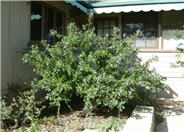
Common name:Ray Hartman California Lilac
Botanical name:Ceanothus 'Ray Hartman'
Growing vigorously as either a large shrub or small tree, the Ray Hartman has big leaves and medium blue, delicate flowers in 3"-5" clusters. It grows to 12' high and 8'-10' wide. This cultivar has good tolerance for heat; it needs occasional deep waterings with good drainage. It attracts hummingbirds, butterflies and beneficial insects.
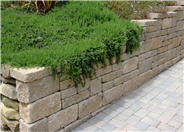
Common name:Prostrate Rosemary
Botanical name:Rosmarinus officinalis 'Prostratus'
The 'Prostratus' grows to a height of 2'-3' with a spread to 8'. Its flowers are pale, lavender blue in color; the leaves are needle-like with a dark, blue-green color. This plant makes a good ground cover, and its leaves can be used as seasoning in cooking.
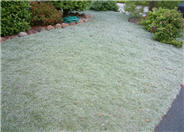
Common name:Dymondia, Rock Ditty
Botanical name:Dymondia margaretae
This foliage is gray/green/silvery; it is a very dense, mat forming ground cover. It tolerates drought, cold, salt spray and poor soils. It's deep rooted and produces small, inconspicuous yellow flowers. Rock Ditty is great for use in between stepping stones or pavers.
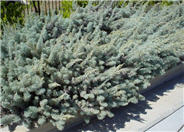
Common name:Powis Castle Artemisia
Botanical name:Artemisia 'Powis Castle'
This mounding shrub reaches 3' high and up to 5' wide with fine silver foliage.
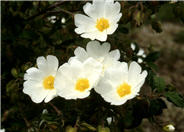
Common name:Sageleaf Rockrose
Botanical name:Cistus salviifolius
This low-spreading shrub reaches a size of 2' tall by 6'-8' wide. It bears white flowers that are 1" wide with yellow centers. This variety makes a good groundcover. The plant requires average to good drainage, and little or no summer watering when established. It should be grown in sun or part shade.
Designer:
Photographer: GardenSoft
Incorporate compost 6" into your soil to retain water, reduce compaction, feed earthworms, and provide valuable nutrients to your plants.
Remove irrigation water and fertilizer from areas where you don't want weeds to grow.